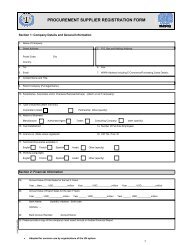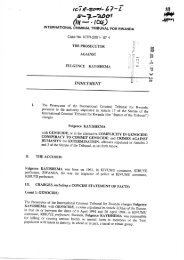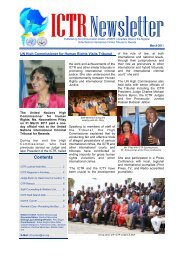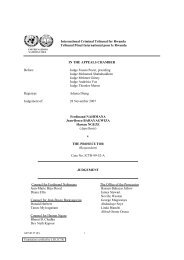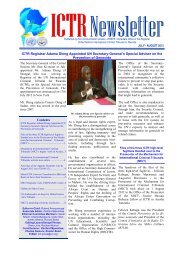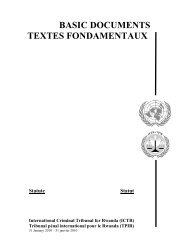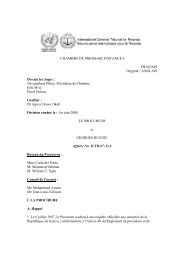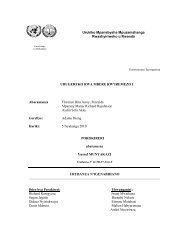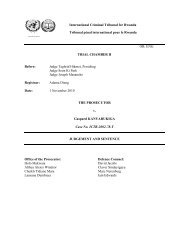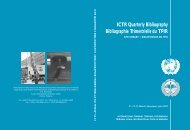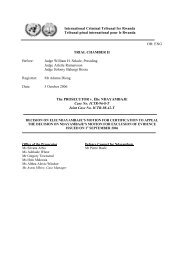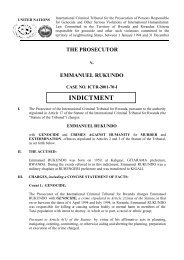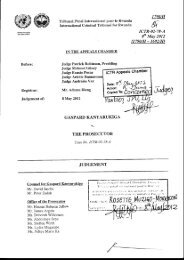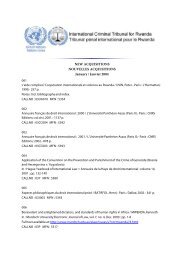Report of Proceedings - International Criminal Tribunal for Rwanda
Report of Proceedings - International Criminal Tribunal for Rwanda
Report of Proceedings - International Criminal Tribunal for Rwanda
Create successful ePaper yourself
Turn your PDF publications into a flip-book with our unique Google optimized e-Paper software.
VII. Challenges <strong>of</strong> the Administration <strong>of</strong> <strong>International</strong> <strong>Criminal</strong> <strong>Tribunal</strong>s<br />
Moderator<br />
Mr. David Crane, Prosecutor, SCSL<br />
Presenters<br />
Hon. Judge Erik Møse, President, ICTR; Mr. Adama Dieng, Registrar, ICTR; Mr. Martin<br />
Ngoga, Deputy Prosecutor General, <strong>Rwanda</strong>n Government; and Mr. Luis Moreno Ocampo,<br />
Prosecutor, ICC<br />
PRESENTATIONS<br />
“The Independence <strong>of</strong> the Judicial Organ <strong>of</strong> the <strong>Tribunal</strong>,” presented by Hon. Judge<br />
Erik Møse<br />
Judge Møse began his presentation by noting that some might find “independence <strong>of</strong> the<br />
judicial organ” to be an unnecessary topic <strong>for</strong> discussion. Is not the independence <strong>of</strong> the<br />
judiciary a self-evident principle? It is stated in all human rights conventions and almost all<br />
constitutions. Judge Møse presented three explanations <strong>for</strong> why this topic warrants discussion.<br />
The first is that even if the idea is old, its implementation has to be steadfastly continued. There<br />
is the continuous task <strong>of</strong> making sure that independence is safeguarded in the daily activities <strong>of</strong><br />
any court. The second reason is that the challenges <strong>for</strong> an international court may well be<br />
different from the challenges <strong>of</strong> a national court. Thirdly, there may be differences between<br />
international tribunals—the challenges to the independence <strong>of</strong> one international criminal<br />
tribunal may well differ from the situation in which another <strong>Tribunal</strong> is operating.<br />
Be<strong>for</strong>e examining independence from the perspective <strong>of</strong> the ICTR, Judge Møse explained<br />
that independence <strong>of</strong> the judicial organ could be discerned from the tripartite structure <strong>of</strong> the<br />
tribunal, which includes one dependent organ and two independent. The registry, based in<br />
Arusha, is in the hierarchy under the UN Secretariat and there<strong>for</strong>e dependent. The bench and<br />
the prosecutor are independent organs, created by the Security Council to adhere to the<br />
principles <strong>of</strong> judicial independence and prosecutorial independence respectively. The tripartite<br />
structure is a necessary consequence <strong>of</strong> the <strong>for</strong>m <strong>of</strong> the decision to set up the tribunal, namely,<br />
the UN Security Council Resolution under Chapter 7 <strong>of</strong> the UN Char ter.<br />
In the ICTR Statute, there is no reference to the independence <strong>of</strong> the tribunal. There<strong>for</strong>e,<br />
the right to be tried by an independent tribunal is not amongst the rights explicitly mentioned<br />
in, <strong>for</strong> example, Articles 19 or 20. This is in spite <strong>of</strong> the fact that Article 20 <strong>of</strong> the ICTR Statute<br />
is so closely modelled on the covenant, Article 14, which states "Everyone shall be entitled to a<br />
fair and public hearing by a competent, independent, and impartial tribunal established by<br />
law". He noted that it has always been the intention that the judicial branch be independent.<br />
This follows from UN human rights conventions, Article 14 <strong>of</strong> the covenant, general comment<br />
13 <strong>of</strong> the human rights committee, and all the basic principles on the independence <strong>of</strong> the<br />
judiciary.<br />
In Prosecutor v. Kanyabashi, the Appeals Chamber found that the accused has the right to<br />
be tried by an independent and impartial tribunal. The Appeals Chamber distinguished between<br />
25



